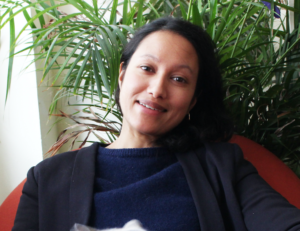Each month we introduce you to one of our Mentors and ask them a few questions about their career and thoughts on UX.
This month we talked to Suki Beg…
 Who is Suki Beg?
Who is Suki Beg?
A design researcher who’s connected organisations to audience insights and facilitated collaboration, for about 9 years – in the e-commerce technology, automotive, mobile sectors, and b2b sectors.
How did you start your career in UX?
I did the pioneering and multidisciplinary MA Narrative Environments course at St Martins, where I was lucky enough to collaborate with psychologists, architects, writers and graphic designers. This was a risky but exciting route, because brand storytelling was a relatively new concept in 2007. We were probably the wild cards of the school. IDEO and ARUP would join forces with us to take a user centred approach to design challenges like, what will the airports of the future be like.
Later I worked in a communications team, where I honed a stealth UX approach to supporting service owners. My managers trusted me to run a card sort on the sly, building engagement in the shadows, run observed user testing here and there. I did dozens of client interviews , where I’d visit start-up business owners at a salon, cafe, vets or a film studio. Without realising it, this was my first taste of observing customers in their space, on their terms. I cultivated a respect for discovery research and the value it brings when shaping products and services.
Later I worked at a creative agency which punched well above its weight, supporting multinational clients in the mobile and motoring industries. The visual designers here were exemplary, as they actively sought out customer data and insights. They were ready to call on researchers as part of a user centred alliance and collaborations were energising and scrappy. We were learning fast and were forced to trust each other.
What is a typical day for you?
No two days are the same, so I’ll describe an ideal one. If I’m preparing for a workshop to launch a project, I’ll catch up with designers and product owners to sense check workshop objectives and walk through insights with them. This helps to minimise communication heft and brain hurt on the day of the workshop.
I’ll spend time reviewing the flow of insights and data and how they might weave together into a seamless narrative. I’ll also make sure insights are presented as visually and accessible as possible.
I may have a specific question or area I’m trying to get guidance in, so would reach out to a mentor or network of experts. LinkedIn and Twitter are great tools for crowdsourcing expertise.
If I’m running interviews, I’ll check that everything’s working and make sure I have enough snacks for the day.
What do you recommend to someone who wants to start a career in UX?
The world needs you more than ever, because it definitely hasn’t run out of design challenges which you can apply a user centred approach to. Seek them out above and beyond your day job.
Actively seek feedback as you make decisions and act on them. However, make your goals clear to anyone who you seek feedback from to avoid unnecessary confusion and pain.
Read broadly and write, because being able to crystallise abstract ideas will make you a better communicator and help you reflect and develop. Be information hungry and strive to challenge your biases and opinions. Ask open questions. Hone curiosity and be open to failure. Learning fast is about frequently making small mistakes and addressing them. It’s better to embrace that then spend weeks on a bigger more expensive failure.
What is the best advice you have received in your career?
Curate information for people who want the fast track as much as those who want details. When I was less experienced , I would walk through a report, which had slides of text, to a group of people, which of course, made people’s brains hurt.
These days I’m more likely to present a simple headline followed by videos which are instantly accessible and powerful. Depending on your data, comics, heat maps and data visuals are just a few ways data can be made more accessible and fun.
What is the future of UX for you?
In more advanced innovation teams user experience principles seem to be embedded across functions so perhaps we won’t need them to be the guardians of user centred thinking. This can be a good thing as they’ll be free to specialise in their respective areas. For me that will involve research which shapes services and opportunities, beyond digital.
Read more about Suki on our Mentoring page
If you are interested in being mentored by Suki, or if you just want to learn more about our mentoring programme, please email us at mentoring@uxpa-uk.org.
